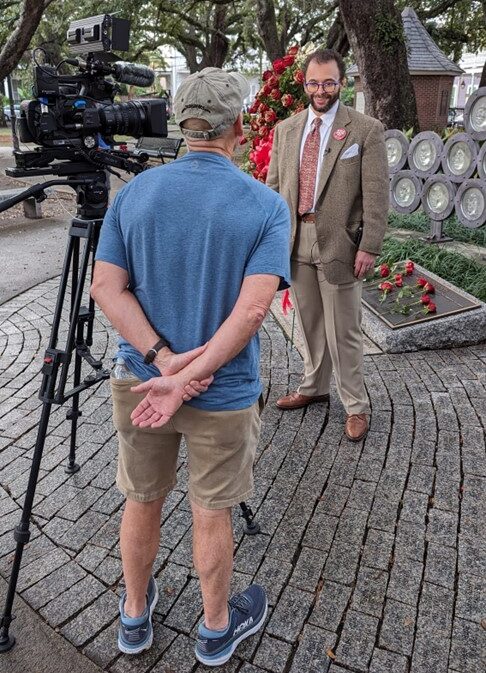Bridging the Gap between Healthcare and Public Health: My Journey as a Public Health Analyst in Infection Prevention and Control
- By: National Network of Public Health Institutes
- Date
The author of “Bridging the Gap,” Public Health Analyst, Climate and Crisis Preparedness, Nicolas G. Llinas, gives an interview to a local New Orleans TV station about the history of World AIDS Day (December 1st, 2023).
Just over a year ago, I joined the NNPHI team as a public health analyst in the Climate and Crisis Preparedness (CCP) portfolio. My primary responsibility in this position has been to research and write about the intersection of the fields of public health and healthcare and explore ways that experts in both disciplines can better collaborate to both improve healthcare outcomes for the patients that clinicians treat at local healthcare facilities, while also advancing population health within our communities. In addition to these academic pursuits, I have also led NNPHI’s efforts for Project Firstline (PFL), a CDC-sponsored, multi-year national collaborative to train and support front line healthcare and public health professionals working in infection prevention and control (IPC). Reflecting on my experiences during this past year, it has become apparently to me that IPC is an exemplary health-related field that showcases the ways in which practitioners of both healthcare and public health can work together to enhance outcomes at both the individual patient level and the community at large. While this combined effort has led to many advances in slowing down the spread of infectious diseases in society and reducing mortality and morbidity in healthcare spaces, it is apparent to me now that public health professionals need to play a greater role in guiding the profession. With this central argument in mind, and starting with this post, I am setting off on a blogging journey that will explore the many areas within the IPC realm where I think public health practice can make a greater impact and offer some ideas for how that might be accomplished. Along the path, I will also take the time to showcase the incredible work that NNPHI’s Project Firstline team, other PFL partners agencies, community stakeholders, and, of course, the incredible professionals working in IPC are doing in the field.
 History, Clinical Science, and Public Health: Oh My!
History, Clinical Science, and Public Health: Oh My!
Before we step out, I think it behooves me to give you a bit of insight into my background, as I think it will explain how I ended up analyzing the juncture of healthcare and public health, which, in practice, are often treated as disparate fields, and perhaps offer you some comfort along the way for the times that I might share unconventional point of view. The first thing to mind is that I did not arrive at NNPHI following the conventional public health path. Neither my undergraduate studies nor the work I have done in graduate school has focused on the field; instead, my academic training and professional temperament are those of a historian. While studying for my Master of Arts in history at the University of Oklahoma, I combined the fields of Latin American history, environmental studies, business history, and indigenous peoples studies to write a thesis that explored efforts by several New Orleans-based companies to build a canal across the Isthmus of Tehuantepec in southern Mexico from the 1850s until the early 20th century in an effort to compete against the Panama Canal. In all attempts, the companies failed to complete the project thanks to, among other things, hurricanes, diplomatic arrogance, and “hostile Indians.” Currently, I am a Ph.D. candidate in the history of medicine at the University of Illinois at Chicago (UIC), where I am writing a dissertation on the history of the World Health Organization’s Global Program on AIDS (WHO-GPA), which ran from 1986 to 1995, when it was replaced by the Joint United Nations Program on HIV/AIDS (UNAIDS). In a future blog post, we will explore together some of the conclusions I have drawn from this work, as it gleans insight into why it’s important for public health professionals and their counterparts working in healthcare to work more closely together. Finally, in addition to my unique academic background, before joining NNPHI, I worked as a clinical research associate for the Division of Infectious Diseases, also at UIC, where I helped coordinate trials for SARS -CoV-2 and HIV/AIDS vaccine and treatment trials. At the affiliated hospital, UI Health, I also served as an administrator for a COVID-19 contact tracing program. As we move forward together, I will draw from both my training as a historian and my experience working in clinical spaces to highlight the advantages of approaching our important public health work from many different perspectives. Now, on with the show!
A Penny for your Thoughts? A Look at How Public Health Can Enhance Infection Prevention and Control Practices through the Lens of IPC Conferences
Perhaps the best way to begin exploring the ways in which public health professionals can make a greater impact in the field of IPC is by looking at the work being conducted by the leading minds. For the first three stops on my blogging journey, we will go on a grand tour of the three premier conferences in IPC, which are hosted by the leading professional societies. The first stop will be in Seattle, Washington for the Society for Healthcare Epidemiology of America (SHEA) annual conference; we will then head over to Orlando, Florida where the Association for Professionals in Infection Control and Prevention (APIC) hosted their annual conference; and finally, we will travel to Boston, Massachusetts for the largest infectious disease conference in the world, ID Week, which is cohosted by SHEA. At each of these events, I reviewed informative posters on the latest research from around the world, met with representatives from industry, public health agencies, healthcare organizations, and professional societies, and heard inspiring presentations from many of the most prominent voices in the profession. Though, as you will see, each conference appealed to a specific audience within the wider IPC profession, I walked away from each with a greater understanding of both the latest science and how public health experts might be able to advance different aspects of the IPC field.

 Subscribe To Our Communications
Subscribe To Our Communications